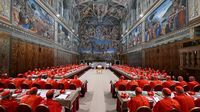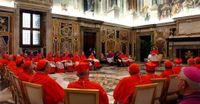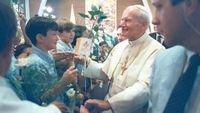Following the death of Pope Francis on April 21, 2025, the Catholic Church is now in the midst of a papal conclave aimed at electing its 267th pope. This conclave, which began on May 7, 2025, has gathered 133 cardinals from around the globe, representing 70 countries, in the Sistine Chapel. The cardinals are sequestered from the outside world, adhering to a centuries-old ritual that ensures their deliberations remain confidential.
The first vote took place on the evening of May 7, but it resulted in black smoke rising from the chapel’s chimney, indicating that no candidate had received the necessary two-thirds majority to be elected. The cardinals will continue to hold votes daily, with the possibility of two ballots in the morning and two in the afternoon until a new pope is chosen.
On the second day of voting, May 8, 2025, black smoke emerged again after the morning ballots, confirming that the electors had not yet reached a consensus. The cardinals are expected to engage in multiple rounds of voting, as history shows that such conclaves can vary significantly in duration, often requiring anywhere from three to eight ballots to elect a new pope.
During the last conclave in 2013, Pope Francis was elected after just five rounds of voting. In contrast, Pope John Paul I was elected on the third ballot in 1978, while his successor, Pope John Paul II, took eight ballots to secure his position.
The conclave follows nine days of mourning for Pope Francis, who served as the head of the Catholic Church for 12 years. His passing has prompted a global outpouring of grief, with thousands of faithful gathering in St. Peter’s Square, awaiting updates on the election process.
As the cardinals cast their votes, they are cut off from all communication with the outside world. Their mobile phones have been surrendered, and the Vatican has jammed airwaves to prevent any contact until a new pope is elected. This level of secrecy is intended to ensure that the cardinals can deliberate freely, without external influence.
The conclave is a momentous occasion in the Catholic Church, which boasts a following of approximately 1.4 billion believers worldwide. The election of a new pope is a pivotal moment that can shape the direction of the Church for years to come.
Historically, conclaves have varied greatly in length. The longest conclave in history lasted an astonishing 1,006 days, following the death of Pope Clement VI in 1268. This prolonged deadlock was due to factional divisions among the cardinals, which ultimately required them to be isolated from the outside world before a decision could be reached.
In modern times, however, conclaves have been more efficient. The last conclave to exceed a week was in 1831, when Pope Gregory XVI was elected after 51 days of voting. Recent conclaves have typically concluded within a matter of days, reflecting a more streamlined voting process.
As the cardinals continue their deliberations, the world watches closely, with many speculating on who the next pope will be. Cardinal Sean O'Malley, a prominent figure in the Church and a former bishop of Fall River, Massachusetts, participated in the 2013 conclave and was once considered a potential papal candidate himself. However, at 80 years old, he is not eligible to vote in the current conclave.
The anticipation surrounding the election is palpable, as many hope for a leader who can unite the Church and address the myriad challenges it faces today. From sexual abuse scandals to the need for reform, the next pope will inherit a complex legacy.
As the conclave unfolds, the faithful await the telltale signs of white smoke, which will signal the election of a new pope. Until then, the cardinals will continue their secretive work, bound by tradition and the weight of their responsibilities. The world is eager to see who will emerge as the next leader of the Catholic Church, a figure who will guide millions in faith and practice.
In the meantime, the eyes of the world remain fixed on the Vatican, where the outcome of this conclave will undoubtedly have lasting implications for the Catholic Church and its followers across the globe.



